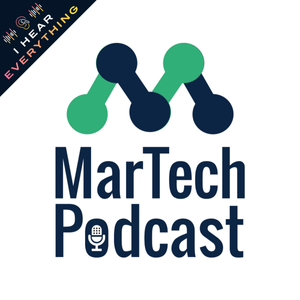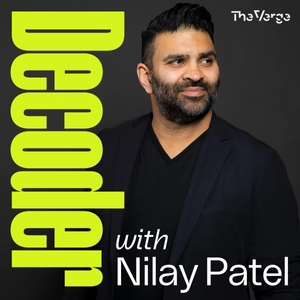
We can change the DNA of an entire species — in the wild
05/02/19 • 45 min
Kevin Esvelt knows the stakes are high. As a geneticist at the MIT Media Lab, Kevin discovered a technique called a gene drive, which gives humans a power we’ve never had before: to change the DNA of entire species in nature. This capacity is so new and so unprecedented that when Kevin made the discovery six years ago, it was “literally unimagined by any human being at that time — not in science fiction, not in any form of literature, not in any scientific journals.” Used successfully for good, a gene drive has the potential to save millions of lives by eliminating diseases like Malaria. But in the wrong hands — or even in well-intentioned hands — the results could be catastrophic. How do we weigh the potential for enormous good against the terrifying unknowns? Host Caterina Fake thinks it through with scientist Kevin Esvelt as well as special guests Baratunde Thurston (Comedian and host of the podcasts Spit and #TellBlackStories); Janna Levin (Director of Science Programs at Pioneer Works, Columbia Professor of Astronomy) and Joi Ito (Director of the MIT Media Lab).
See Privacy Policy at https://art19.com/privacy and California Privacy Notice at https://art19.com/privacy#do-not-sell-my-info.
Kevin Esvelt knows the stakes are high. As a geneticist at the MIT Media Lab, Kevin discovered a technique called a gene drive, which gives humans a power we’ve never had before: to change the DNA of entire species in nature. This capacity is so new and so unprecedented that when Kevin made the discovery six years ago, it was “literally unimagined by any human being at that time — not in science fiction, not in any form of literature, not in any scientific journals.” Used successfully for good, a gene drive has the potential to save millions of lives by eliminating diseases like Malaria. But in the wrong hands — or even in well-intentioned hands — the results could be catastrophic. How do we weigh the potential for enormous good against the terrifying unknowns? Host Caterina Fake thinks it through with scientist Kevin Esvelt as well as special guests Baratunde Thurston (Comedian and host of the podcasts Spit and #TellBlackStories); Janna Levin (Director of Science Programs at Pioneer Works, Columbia Professor of Astronomy) and Joi Ito (Director of the MIT Media Lab).
See Privacy Policy at https://art19.com/privacy and California Privacy Notice at https://art19.com/privacy#do-not-sell-my-info.
Previous Episode

When your invention becomes a weapon
What do you do if your invention becomes a weapon? This happened to Chris Anderson, former editor of Wired Magazine, who launched DIY Drones, an open source community that helps anyone build their own flying machines. Chris and his community evolved drones from a military tool to an everyday gadget. Now, drones are used by conservationists to monitor bird's nests, contractors to insure safety standards at building sites, and filmmakers to capture sweeping vistas, among other things. But, they're also used by ISIS to drop bombs on civilians. So, what is Chris' responsibility? Did he foster innovation for a community of like-minded do-gooders or democratize a weapon for a terrorist group across the globe? Host Caterina Fake discusses the possibilities with 3DR founder and CEO Chris Anderson and special guests comedian Baratunde Thurston and Quartz Editor-in-Chief Kevin Delaney.
See Privacy Policy at https://art19.com/privacy and California Privacy Notice at https://art19.com/privacy#do-not-sell-my-info.
Next Episode

What if you could Photoshop your voice?
Mike Pappas and Carter Huffman believe their invention fulfills the promise of the digital world: the complete freedom to design your identity. But what if we all used it? The human voice is a key marker of authenticity and individuality, and Modulate uses A.I to transform your voice into anything you want it to be. In real time. If you’re a woman and want to sound like a man, Modulate can help you. If you’re a teen and want to sound like a grandparent, Modulate can do that. If you’re from Italy but want to adopt a French accent, speak into Modulate, and you will. Should this exist? The gift of free expression also comes with a price. Yes: Modulate could allow people to be their true selves and speak in a voice that represents who they are. Yes: Modulate could expose institutional vocal bias against certain sounds and accents. But it also could contribute to the world of deep faking and harassment. At what point is digitizing our real-world identity too much?
See Privacy Policy at https://art19.com/privacy and California Privacy Notice at https://art19.com/privacy#do-not-sell-my-info.
If you like this episode you’ll love
Episode Comments
Generate a badge
Get a badge for your website that links back to this episode
<a href="https://goodpods.com/podcasts/should-this-exist-11646/we-can-change-the-dna-of-an-entire-species-in-the-wild-430416"> <img src="https://storage.googleapis.com/goodpods-images-bucket/badges/generic-badge-1.svg" alt="listen to we can change the dna of an entire species — in the wild on goodpods" style="width: 225px" /> </a>
Copy




